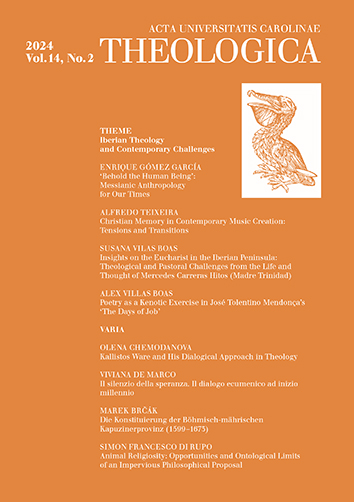AUC Theologica is a peer-reviewed journal for theology published twice a year. As we publish original papers in English, German, French, and Italian, our mission is to serve as a platform both for Czech researchers, who can present their research results in these languages, and for international contributors, who are invited to enter the academic theological discussion in the heart of Europe.
The journal focuses on a wide range of theological disciplines, such as systematic theology, biblical studies, patristic studies, pastoral and spiritual theology, religious education, church history, etc. Within these fields, the journal seeks to reflect the current theological questions and problems, which often requires interdisciplinary approaches. Supporting the intersection of various theological disciplines, we thus also welcome theological papers touching other academic fields including philosophy, sociology, literary studies, and science.
Each issue consists of two sections. The thematic section presents papers of the same focus. The section called ‘Varia’ invites papers dealing with various theological themes from the perspective of all Christian traditions. Our current and past issues are approachable for free on this website in the form of Open Access.
AUC THEOLOGICA, Vol 12 No 1 (2022), 83–100
The Stranger in the Bible: The Needy and the Brother
Jiří Dosoudil
DOI: https://doi.org/10.14712/23363398.2022.19
published online: 25. 11. 2022
abstract
The article explores the Bible’s relationship to immigrants and people perceived by society as foreigners. The topic is addressed against the backdrop of ongoing society-wide discussions about helping people who have been forced to leave their homes as a result of the February 2022 Russian aggression in Ukraine: outlining how the Bible addresses the issue of acceptance and coexistence with refugees and immigrants is intended primarily as a contribution to the debate in a Christian forum. It shows that the Old Testament society, as long as they were willing to accept the required way of life, treated these people kindly and forbade any disadvantage to them by the local society. The Israelites, it is recalled, were themselves guests in Egypt, so foreigners in Israel should remind them of their own identity as suffering but also God-delivered people. In the New Testament, this attitude is elaborated in a new theologically anchored universalism: the stranger is spoken of in a figurative sense, but in practice, the barriers between the local and the stranger are overcome. The stranger, here as an unknown person, a traveller, is one of the persons in need, and by helping him, the Christian fulfils the gospel of Jesus and meets with God. Although some circles in the Early Church tended to oppose the values and customs of the outside world, they never resigned themselves to the ideal of practically lived brotherly love, which newly included the stranger and the unknown. The paper proves that love for foreigners, regardless of their origin or circumstances, is organically rooted in the Bible and Christian ideals.
keywords: Stranger; Foreigner; Alien; Immigrant; Israel; Church; Poor; Needy; Love

The Stranger in the Bible: The Needy and the Brother is licensed under a Creative Commons Attribution 4.0 International License.
148 x 210 mm
periodicity: 2 x per year
print price: 100 czk
ISSN: 1804-5588
E-ISSN: 2336-3398
